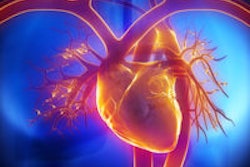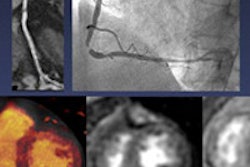
A multicenter study in the U.S. and Canada of more than 10,000 patients found CT angiography (CTA) to be equivalent to functional tests such as stress echocardiography and nuclear myocardial perfusion imaging (MPI) in patients with symptoms of heart disease, according to results presented at this week's American College of Cardiology (ACC) meeting in San Diego.
Researchers presenting the Prospective Multicenter Imaging Study for Evaluation of Chest Pain (PROMISE) touted it as the "first-ever randomized controlled trial" to compare clinical outcomes head to head in patients receiving either CTA or functional stress tests such as stress echo, SPECT MPI, or stress electrocardiography (ECG). The goal of the study was to compare CTA with the functional modalities in a real-world environment, according to the authors.
Of the 10,003 patients seen at 193 centers in the U.S. and Canada, half were randomized to receive a CTA scan while the others were given functional tests. The study participants had no history of coronary artery disease, but they were symptomatic. Nearly all of them also had at least one risk factor for cardiovascular disease, such as high blood pressure, diabetes, or smoking history. In the cohort who received functional exams, 68% received nuclear testing, 22% received stress echo, and 10% underwent exercise ECG.
The researchers found CTA to be more or less equivalent to the functional tests in terms of outcomes, which the researchers defined as death, heart attack, major procedural complications, or hospitalization for chest pain. At least one of these developments occurred at a rate of about 3% in both groups, which the authors characterized as being "lower than expected" considering the number of risk factors in the patient population.
CTA did have an edge in terms of the number of patients who had successful cardiac catheterizations, which were required for 10% of study participants. Only 3.4% of patients who received CTA scans had catheterizations that failed to identify narrowing arteries, while 4.3% of patients in the functional group had unsuccessful cath procedures. CTA also had an edge in terms of radiation dose compared to the nuclear functional tests.
The results indicate that both CTA and functional tests are good options for diagnosing heart problems, but CT might have an advantage in terms of fewer follow-up procedures and lower radiation dose compared to nuclear MPI, the researchers concluded.



















